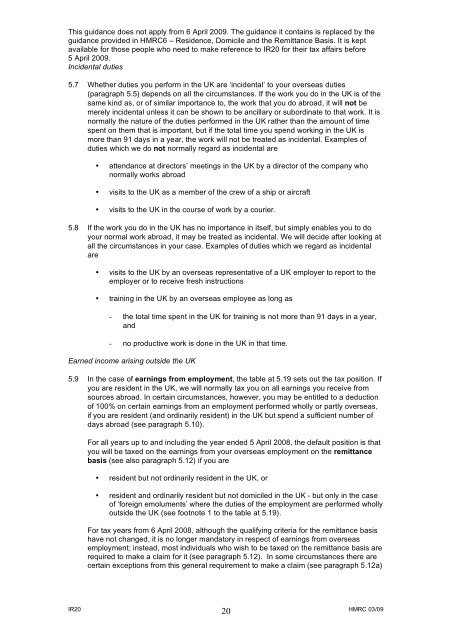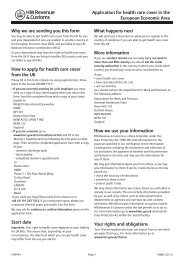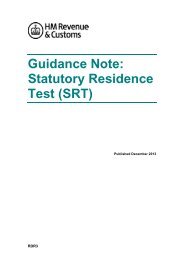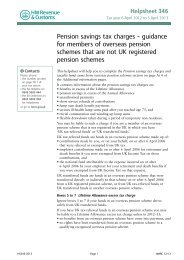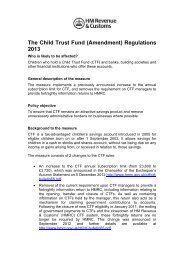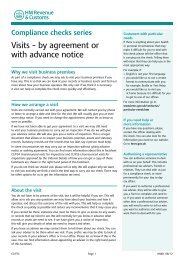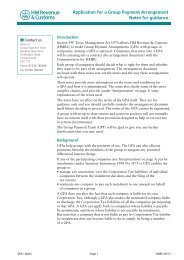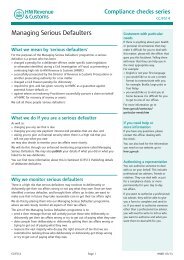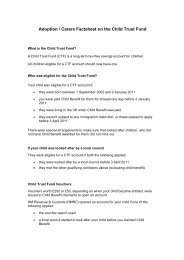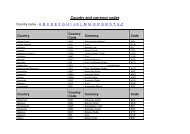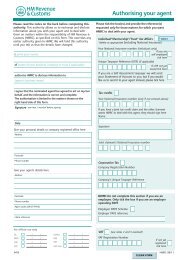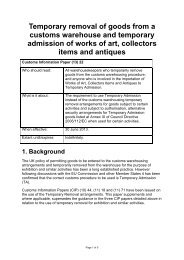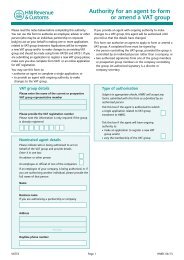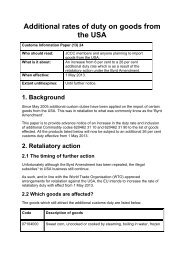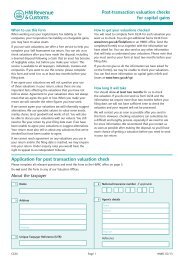IR20 - Residents and non-residents liability to tax in the United ...
IR20 - Residents and non-residents liability to tax in the United ...
IR20 - Residents and non-residents liability to tax in the United ...
Create successful ePaper yourself
Turn your PDF publications into a flip-book with our unique Google optimized e-Paper software.
This guidance does not apply from 6 April 2009. The guidance it conta<strong>in</strong>s is replaced by <strong>the</strong><br />
guidance provided <strong>in</strong> HMRC6 – Residence, Domicile <strong>and</strong> <strong>the</strong> Remittance Basis. It is kept<br />
available for those people who need <strong>to</strong> make reference <strong>to</strong> <strong>IR20</strong> for <strong>the</strong>ir <strong>tax</strong> affairs before<br />
5 April 2009.<br />
Incidental duties<br />
5.7 Whe<strong>the</strong>r duties you perform <strong>in</strong> <strong>the</strong> UK are ‘<strong>in</strong>cidental’ <strong>to</strong> your overseas duties<br />
(paragraph 5.5) depends on all <strong>the</strong> circumstances. If <strong>the</strong> work you do <strong>in</strong> <strong>the</strong> UK is of <strong>the</strong><br />
same k<strong>in</strong>d as, or of similar importance <strong>to</strong>, <strong>the</strong> work that you do abroad, it will not be<br />
merely <strong>in</strong>cidental unless it can be shown <strong>to</strong> be ancillary or subord<strong>in</strong>ate <strong>to</strong> that work. It is<br />
normally <strong>the</strong> nature of <strong>the</strong> duties performed <strong>in</strong> <strong>the</strong> UK ra<strong>the</strong>r than <strong>the</strong> amount of time<br />
spent on <strong>the</strong>m that is important, but if <strong>the</strong> <strong>to</strong>tal time you spend work<strong>in</strong>g <strong>in</strong> <strong>the</strong> UK is<br />
more than 91 days <strong>in</strong> a year, <strong>the</strong> work will not be treated as <strong>in</strong>cidental. Examples of<br />
duties which we do not normally regard as <strong>in</strong>cidental are<br />
• attendance at direc<strong>to</strong>rs’ meet<strong>in</strong>gs <strong>in</strong> <strong>the</strong> UK by a direc<strong>to</strong>r of <strong>the</strong> company who<br />
normally works abroad<br />
• visits <strong>to</strong> <strong>the</strong> UK as a member of <strong>the</strong> crew of a ship or aircraft<br />
• visits <strong>to</strong> <strong>the</strong> UK <strong>in</strong> <strong>the</strong> course of work by a courier.<br />
5.8 If <strong>the</strong> work you do <strong>in</strong> <strong>the</strong> UK has no importance <strong>in</strong> itself, but simply enables you <strong>to</strong> do<br />
your normal work abroad, it may be treated as <strong>in</strong>cidental. We will decide after look<strong>in</strong>g at<br />
all <strong>the</strong> circumstances <strong>in</strong> your case. Examples of duties which we regard as <strong>in</strong>cidental<br />
are<br />
• visits <strong>to</strong> <strong>the</strong> UK by an overseas representative of a UK employer <strong>to</strong> report <strong>to</strong> <strong>the</strong><br />
employer or <strong>to</strong> receive fresh <strong>in</strong>structions<br />
• tra<strong>in</strong><strong>in</strong>g <strong>in</strong> <strong>the</strong> UK by an overseas employee as long as<br />
- <strong>the</strong> <strong>to</strong>tal time spent <strong>in</strong> <strong>the</strong> UK for tra<strong>in</strong><strong>in</strong>g is not more than 91 days <strong>in</strong> a year,<br />
<strong>and</strong><br />
- no productive work is done <strong>in</strong> <strong>the</strong> UK <strong>in</strong> that time.<br />
Earned <strong>in</strong>come aris<strong>in</strong>g outside <strong>the</strong> UK<br />
5.9 In <strong>the</strong> case of earn<strong>in</strong>gs from employment, <strong>the</strong> table at 5.19 sets out <strong>the</strong> <strong>tax</strong> position. If<br />
you are resident <strong>in</strong> <strong>the</strong> UK, we will normally <strong>tax</strong> you on all earn<strong>in</strong>gs you receive from<br />
sources abroad. In certa<strong>in</strong> circumstances, however, you may be entitled <strong>to</strong> a deduction<br />
of 100% on certa<strong>in</strong> earn<strong>in</strong>gs from an employment performed wholly or partly overseas,<br />
if you are resident (<strong>and</strong> ord<strong>in</strong>arily resident) <strong>in</strong> <strong>the</strong> UK but spend a sufficient number of<br />
days abroad (see paragraph 5.10).<br />
For all years up <strong>to</strong> <strong>and</strong> <strong>in</strong>clud<strong>in</strong>g <strong>the</strong> year ended 5 April 2008, <strong>the</strong> default position is that<br />
you will be <strong>tax</strong>ed on <strong>the</strong> earn<strong>in</strong>gs from your overseas employment on <strong>the</strong> remittance<br />
basis (see also paragraph 5.12) if you are<br />
• resident but not ord<strong>in</strong>arily resident <strong>in</strong> <strong>the</strong> UK, or<br />
• resident <strong>and</strong> ord<strong>in</strong>arily resident but not domiciled <strong>in</strong> <strong>the</strong> UK - but only <strong>in</strong> <strong>the</strong> case<br />
of ‘foreign emoluments’ where <strong>the</strong> duties of <strong>the</strong> employment are performed wholly<br />
outside <strong>the</strong> UK (see footnote 1 <strong>to</strong> <strong>the</strong> table at 5.19).<br />
For <strong>tax</strong> years from 6 April 2008, although <strong>the</strong> qualify<strong>in</strong>g criteria for <strong>the</strong> remittance basis<br />
have not changed, it is no longer m<strong>and</strong>a<strong>to</strong>ry <strong>in</strong> respect of earn<strong>in</strong>gs from overseas<br />
employment; <strong>in</strong>stead, most <strong>in</strong>dividuals who wish <strong>to</strong> be <strong>tax</strong>ed on <strong>the</strong> remittance basis are<br />
required <strong>to</strong> make a claim for it (see paragraph 5.12). In some circumstances <strong>the</strong>re are<br />
certa<strong>in</strong> exceptions from this general requirement <strong>to</strong> make a claim (see paragraph 5.12a)<br />
<strong>IR20</strong> 20<br />
HMRC 03/09


